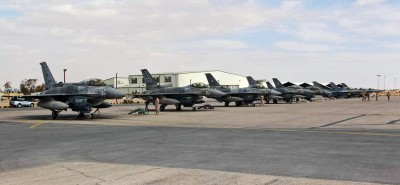
The Emirates’ decision to launch fresh airstrikes from the kingdom after a more-than-monthlong hiatus was a strong show of support for Western-allied Jordan, which has vowed a punishing response to the militants’ killing of one of its pilots.
It also is likely to quiet concerns in Washington about the oil-rich Emirates’ commitment to the fight.
The seven-state federation, which includes Abu Dhabi and Dubai, stopped conducting airstrikes late last year after Jordanian Lt. Muath al-Kaseasbeh was captured when his plane crashed behind enemy lines, according to American officials. Al-Kaseasbeh was later burned alive in a cage by the militants.
American defense officials last week said they moved search-and-rescue aircraft closer to the battlefield, helping ease allies’ concerns about the coalition’s ability to aid downed pilots.
The General Command of the UAE Armed Forces said Emirati F-16s carried out a series of strikes Tuesday morning, according to a brief statement carried by the Gulf nation’s official WAM news agency.
The fighters returned safely back to base after striking their targets, the statement said. It did not elaborate, nor did it say whether the strikes happened in Syria or Iraq. The militants hold roughly a third of each country in a self-declared caliphate.
Previous Emirati airstrikes had been in Syria, making that the most likely site of its latest targets.
The Emirates had not commented on the suspension of its airstrikes in December, and Tuesday’s statement was the first confirmation it had restarted combat operations.
It has continued to provide logistical support to the campaign by hosting coalition warplanes at its air bases on the southern rim of the Persian Gulf.
On Saturday, the Emirates announced it was deploying a squadron of F-16s to Jordan.
Abdulkhaleq Abdullah, a professor of political science at Emirates University, said the decision to resume flights from Jordan was meant to “send the right message to everybody that the UAE stands by its friends in times of need.”
He predicted the Emirati role in the coalition would be even stronger than before now that it has American assurances about search-and-rescue capabilities.
“It’s a relentless campaign and it has to be carried out until Daesh is defeated,” he said, using an Arabic acronym for the Islamic State group. “I think the UAE firmly believes this, probably more than any other Arab county.”
The Emirati announcement came as Syria’s President Bashar Assad said in comments published Tuesday that his government has been receiving general messages from the American military about airstrikes targeting the Islamic State group inside Syria but that there is no direct cooperation.
In an interview with the BBC, Assad said the messages are conveyed through third parties, such as Iraq.
“Sometimes they convey message, general message, but there’s nothing tactical,” he said.
American and allied Arab planes conducting airstrikes in Syria share the skies with Assad’s air force, which also targets the militants.
Syrian officials have maintained that they have not been consulted about the airstrikes since they started in September — only informed through third parties in the beginning.
White House press secretary, Josh Earnest, said there has been no coordination as to specific details of U.S. military operations in Syria.
Prior to initiating strikes in Syria, the U.S. did “inform the Syrian regime through the ambassador to the United Nations,” Earnest said. “What was made clear in that communication is that it’s the responsibility of the Syrian government, to put it bluntly, to stay out of the way,” he added.
Pentagon spokesman Navy Rear Adm. John Kirby also stressed that the U.S. was “not communicating, directly or indirectly” with the Syrian government over airstrikes against Islamic State.
In the interview, Assad also denied his forces have used barrel bombs. The government’s use of the crude explosive devices, usually dropped by helicopters, has been widely documented by international human rights organizations and residents of opposition-held areas in Syria. The barrel bombs, which cannot be precisely targeted, have killed thousands of civilians, according to Syrian activists.
“I know about the army; they use bullets, missiles, and bombs. I haven’t heard of the army using barrels, or maybe, cooking pots,” Assad said, apparently making light of the allegations.
Pressed again about their use, he replied: “They’re called bombs. … There are no barrel bombs; we don’t have barrels.”
AP

Leave a Reply
You must be logged in to post a comment.